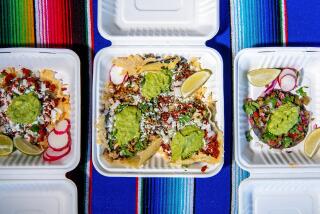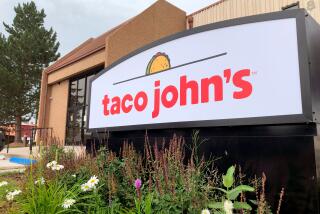Taco Bell to Acquire Chevys Full-Service Chain : Restaurants: The Irvine-based fast-food giant hopes to expand the 37-unit company to 300 eateries within five years and use its bulk-buying power and financial resources to help it succeed.
- Share via
IRVINE — Taco Bell Corp. said Tuesday that it will buy the Chevys restaurant company with the intent of making it the first nationwide sit-down Mexican chain.
Taco Bell, which with 3,900 restaurants is the predominant force in Mexican fast food, said it hopes to expand Chevys within five years into a chain of at least 300 units. Chevys, based in San Francisco, now has 34 restaurants in Northern California and three in Southern California, including locations in Irvine and Fountain Valley.
Terms of the deal, which must be approved by directors of Taco Bell’s parent company, Pepsico Inc., were not disclosed.
Taco Bell, based in Irvine, said last month that it was shopping for a full-service restaurant chain. It also announced grocery store test-marketing of its taco shells and sauces.
John Martin, Taco Bell’s president, said he plans to leave Chevys under the direction of its chairman, Mike Hislop, who took over two years ago. Martin said the expansion will start as soon as the Chevys deal closes, probably in eight weeks.
Taco Bell, he said, will provide funds for the expansion and use its bulk-buying power to help lower Chevys’ ingredients costs.
Chevys has tried to differentiate itself from the pack of Mexican restaurant chains with a “Fresh Mex” concept--emphasizing lighter fare and not depending as much on bar sales as do regional chains such as Chi-Chi’s, which has more than 200 restaurants across the nation, and El Torito, with about 175.
Chevys restaurants offer tortillas delivered from griddle to table in three minutes and salsa made every half hour.
The company has grown rapidly. Founded in 1986 in Alameda, it has seen its sales more than triple in the past four years to about $100 million projected for 1993.
“We’re pumped up,” Hislop said of the Taco Bell deal. “We’ve been talking awhile, and we’re glad we came together.”
Hislop said he and Martin share the view that Chevys can benefit from rapid growth, and he predicted that Chevys will “ultimately be the dominant player in the mid-scale Mexican market.”
With the infusion of Taco Bell capital, Chevys plans to expand into Colorado, Arizona, Nevada and Missouri. Most Chevys restaurants are conversions of existing buildings such as other eateries and even a couple of former banks, Hislop said, which holds down construction costs.
Taco Bell, too, has grown rapidly. It now has 70,000 employees and annual sales of $3.3 billion 1992, more than double its sales of $1.5 billion in 1987.
Martin, who took over in 1983, has sought to expand further by setting up Taco Bell carts in unconventional locations such as school cafeterias and gas stations.
Analysts say that Taco Bell has a good chance of succeeding in the full-service segment of the restaurant business.
“If any company can do it, Taco Bell can,” said Janet Lowder, a restaurant industry consultant based in Rancho Palos Verdes. “I think it’s a natural extension, since they have had the opportunity to take fast-food Mexican to all corners of the United States. The next step up is full service with a casual theme.”
For parent Pepsico, “this is a rational way to dip their toe in the water,” said analyst Emanuel Goldman at the brokerage PaineWebber Securities in San Francisco. “Their interest is in the full-service dining part of the business, because they have practically no position there.”
Pepsico, with annual revenue of more than $20 billion, also operates the Kentucky Fried Chicken and Pizza Hut restaurant chains. It also owns a 50% share in the California Pizza Kitchens chain.
Goldman noted that Taco Bell’s expansion fits into parent Pepsico’s overall strategy. The company, based in Purchase, N.Y., has plans for $1 billion worth of acquisitions, including investments in bottling companies and snack-food operations.
Analysts say that Mexican food is one of the fastest-growing segments of the U.S. restaurant industry. Taco Bell will face competition from a number of regional chains besides Chi-Chi’s, based in Louisville, Ky., and Irvine-based Restaurant Enterprises Group’s El Toritos. Others are Don Pablo’s, based in Dallas, and Cantina del Rio in Columbus, Ohio.
Besides competition, Taco Bell must also consider the dangers of doing too much, too fast. Del Taco, the nation’s second-largest Mexican-style fast-food chain, filed for bankruptcy protection in March. The company, based in Costa Mesa, cited heavy debt that resulted in part from an ambitious growth plan.
More to Read
Inside the business of entertainment
The Wide Shot brings you news, analysis and insights on everything from streaming wars to production — and what it all means for the future.
You may occasionally receive promotional content from the Los Angeles Times.










